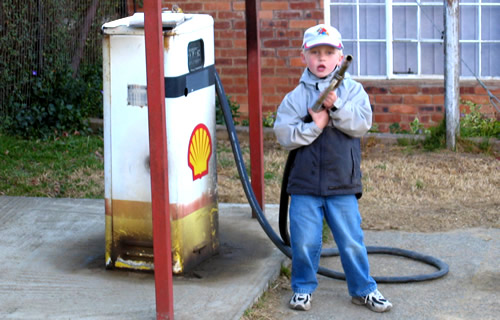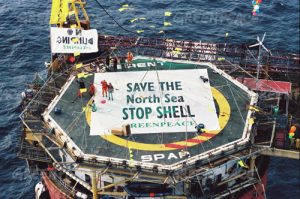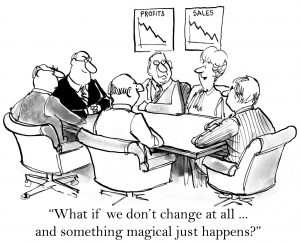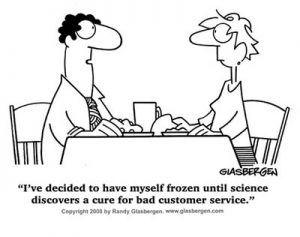It was while leading a program of technical work at the heart of Royal Dutch Shell in the mid-1990s that I was thrown into the deep end of organisation culture change. My team was architecting, developing and managing a series of digital communications platforms for Royal/Dutch Shell’s ambitious global transformation program, targeted to reach over 120,000 Shell employees around the world. This was organisation change on a grand scale!

One of the world’s most recognisable brands. In 2018, Royal Dutch Shell made a profit of 23.9 billion U.S. dollars.
Shell’s Transformation Program¹ is well documented and was conceived in an era when the company was not only dealing with oil prices trending down from $20 to $11 a barrel but was also generating a steady flow of negative publicity surrounding it’s activities in Nigeria. While this story was percolating, Shell lurched into another fiasco that would expose just how out of touch it was with its public. That was when the company hit the headlines with a plan to dispose of the Brent Spar oil rig by towing it out to sea and then sinking it to the bottom of the deep Atlantic Ocean.
When Greenpeace activists occupied the Brent Spar and journalists quickly lined up to question the integrity of Shell’s plan, its response displayed the classic symptoms of an organisation that was, culturally speaking, so deeply invested in the status-quo of a bygone era that key decision-makers within the organisation dug their heels in to defend it. Shell’s die-hard attachment to shareholder value and the expediencies associated with that mindset had cast a dark shadow over widespread public interest and concern. This set off a chain reaction which exposed something that can only be described as a brand personality disorder. In other words, a culture that was out of sync with the most reasonable expectations of society, that it should no longer abuse the natural environment in this way. To this day it represents a classic case study on how not to respond to a crisis in public confidence and trust.
Shell’s apparent personality flaw became increasingly obvious as the company argued in the media that there was nothing wrong with it’s disposal plan for the Brent Spar, because this was the way the company had always disposed of retired oil rigs… As far as Shell was concerned, this was the most cost-effective option and it insisted that there were no meaningful environmental impacts associated with its plan. What Shell hadn’t costed in were alternative options or the hit to shareholders.
For almost six months, Shell’s management dug in, refusing to re-consider its decision and this sealed Shell’s fate in the court of public opinion. Shell argued and and continued to argue their case just long enough for public anger to boil over. The value of Shell’s shares tumbled as protests and boycotts against the brand sprung up around Europe, some of which turned violent, including the firebombing of a fuel station in Germany.

Greenpeace played a key role in the campaign that stopped Shell from dumping the Brent Spar in the Atlantic (Photo courtesy: Greenpeace)
Scuppering the Brent Spar was never the most cost-effective way to dispose of it, but as far as Shell was concerned, it was the most expedient. This is only one example of how the conception and employment of expedient measures is one of the key areas where institutionalised processes have a tendency to drive cultures that are prone to overstepping legitimate public interests and concerns.
Thanks largely to a campaign by Greenpeace this toxic pile of steel, concrete and various nasty chemicals was eventually towed to a Scandinavian marine scrapyard where it was dismantled and recycled. This not only saved a hit on the environment, but actually netted Shell a small windfall. It also prompted the company to launch what would become know as the Shell Transformation Program.
The stated objective of the transformation program was to improve Shell’s financial performance by driving personal accountability, openness and honesty. In short, integrity. Evidently, these and other scandals involving the company had taken their toll. What was it, exactly, that needed to change? Behaviour. The program aimed to stamp out the kind of institutionalised behaviours that all of these scandals led back to. Not only were these behaviours gnawing at Shell’s reputation, but also it’s earnings.
As a systems analyst, I was immersed in one of the most exciting challenges of my career, using digital communications technology to align personal and corporate values. So, naturally I was spending a lot of time thinking about change and how technology could be used to systematically motivate a global organisation to adopt new ways of doing things. I was also in very good company because my cues and a fair amount of wisdom came to me, either directly or indirectly, from then Chairman Sir Mark Moody-Stuart – who, more recently in 2015, made a startling comment about climate change.

It wasn’t long afterwards, that Shell released the first corporate social responsibility report, which got me thinking even more about the features that distinguish genuinely good corporate citizens from all others. Clearly, the answer to that question has not changed: everything rests on the behaviour of people. Companies do not care about anything and they do not make bad choices. It is always people who do these things. You could say all of that is changing with AI, but artifical Intelligence is just that. No less artificial than the plastic flowers.
When one person demonstrates behaviour that is damaging to the reputation of a brand gains wider, cultural acceptance within the organisation, then the business is in very big trouble. Left unchecked, it will at some point, lead to an existential crisis which those who tolerate it are unlikely to see coming, because to tolerate any behaviors and decision-making that disrespects the legitimate interests and concerns of any customer, employee or shareholder amounts to a misrepresntation of the brand.
There is strong evidence pointing to correlations between the quality of the products and services and the desirability of environmental, social and economic outcomes. In other words, outcomes associated with so-called “ethical brands” are far more desirable than those associated with organisations that practice business as usual. As long as they can keep selling more and more of the same, if not similar stuff, at the lowest cost then as far as they’re concerned, everything will be okay, at least for them. However, one of the inescapable consequences of trading goods and or services is that each and every transaction produces strong anecdotal and empirical evidence of the underlying culture of the organisation.

The current rate at which the world is consuming resources is unsustainable. That’s not some weird science. Just a fact. At some point, perhaps we will either self-destruct, or adapt to the new world, but we cannot rely on that unless more people are empowered with the ability to make better choices, which fundamentally means being more thoughtful about what we buy and where we choose to shop, work, play rest and invest.
In 2005 I cashed in my dot.com era chips and dedicated myself to figuring out how data can be used to identify and qualify so-called ethical brands so that one day the eb™ trademark would become a reliable symbol of brand integrity and trust. Today, the Ethical Brand Foundation owns all of the intellectual property associated with the means to authenticate and license genuine ethical brands to display the eb™ symbol. We have a proven model for obtaining and analysing all of the data needed to assess the character of any organisation, or brand. This research enables us to not only join dots, but draw scientifically valid conclusions about the social, economic and environmental integrity of any organisation – with or without its co-operation.
References:
¹Kaptein, Muel, and Johan Ferdinand Dietrich Bernardus Wempe. “Invitation to Dialogue.” The Balanced Company: A Theory of Corporate Integrity. Oxford: Oxford UP, 2002. N. pag. Print.
 If you have an interest in the field of commercial ethics and or organisation culture then please keep in touch by subscribing to this blog. You may also like to join our growing international community of followers by subscribing to the eb Daily™ our lightly curated, quick-read news service, that’s free!
If you have an interest in the field of commercial ethics and or organisation culture then please keep in touch by subscribing to this blog. You may also like to join our growing international community of followers by subscribing to the eb Daily™ our lightly curated, quick-read news service, that’s free!